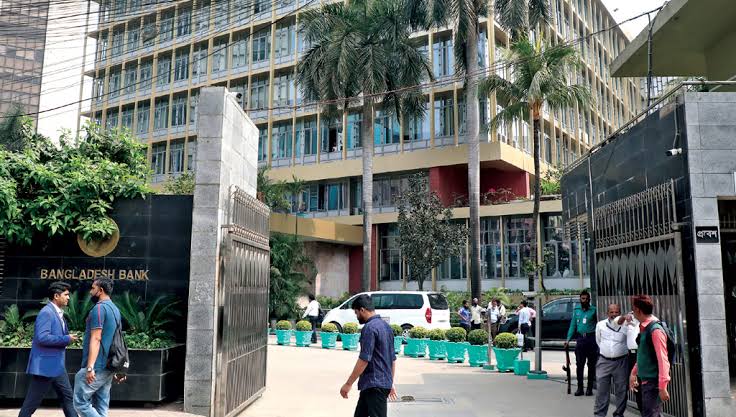Special Correspondent
Published:2024-11-29 15:21:25 BdST
Fear of rise in default loansBusinesses worried about new BB policy
Top businessmen and leaders of different trade bodies have expressed concern about the new rules for loan classification by the Bangladesh Bank.
With no investment in the country’s private sector in the last six months, there is still instability in the financial sector.
Under the circumstances, the new prescription of the International Monetary Fund (IMF) has instilled new fears among businessmen. This will result in disruption of investment and subsequently, employment will be affected.
Bankers said that maintaining additional provisions against regular and defaulted loans will have a negative impact on bank profits. The planning adviser also feared recession due to the stagnation of investment.
According to the latest data from the central bank, non-performing loans (NPLs) in the banking sector reached a record high of Tk2,84,977 crore by the end of September this year, accounting for around 17% of total outstanding loans.
In the July-September quarter, the amount of disbursed loans stood at Tk16,82,822 crore. Default loans at state-run commercial banks increased by Tk23,628 crore, while at private ones by Tk49,885 crore. Earlier, the NPLs rose to Tk2,11,391 crore at the end of June.
Bangladesh has been fulfilling various conditions at times to get loans from the International Monetary Fund (IMF). In this continuation, the central bank has revised the loan classification policy.
Starting 1 April 2025, loans will be classified as overdue from the day after their expiry date, according to a Bangladesh Bank circular. The circular, issued by the Banking Regulation and Policy Department on Wednesday, applies to all scheduled banks in the country.
As per the classifications for overdue loans, if the loan is overdue for three to six months, it will be classified as ‘Substandard’, for six to 12 months ‘Doubtful’, and for more than 12 months ‘Bad/Non-performing’.
According to the circular, for standard loans, a general provision of 1% of the loan balance must be maintained. For special mention accounts, 5% of the loan balance must be reserved as a general provision. Additionally, for non-performing loans, specific provisions must be maintained as follows: 20% of the provision base for substandard loans, 50% for doubtful loans, and 100% for bad or impaired loans. Interest income from substandard or doubtful loans must be deposited in a suspense account rather than the loan account.
Shams Mahmud, former president of the Dhaka Chamber of Commerce and Industry (DCCI), said the Bangladesh Bank's new rule on defaulted loans goes against the private sector as it will disrupt investment and affect the employment scenario.
“Overall, the macroeconomic stability of the country will be affected. To meet the IMF’s loan conditions, the government is setting many rules. But we have to keep in mind that the reality was kept hidden earlier, but now the economic wounds are being exposed. I think the fresh move by the BB will not yield any good result.”
Shams, also the managing director of Shasha Denims, said business entities must not be blamed alone for the soaring of defaulted loans as other issues should be brought under the scanner.
On the one hand the exchange rate of the US dollar has gone up, but on the other hand fuel prices and labour wages have increased. Besides, there are two Eids ahead, he said.
“If this new BB policy comes into effect in April, the ready-made garment sector may face a major shock. If that happens, the overall economic stability will also be affected. I am afraid that defaulted loans will increase further.”
He added, “This decision was not timely. The government should renegotiate the matter with the IMF and reconsider the decision.”
While briefing the reporters after the Executive Committee of the National Economic Council (ECNEC) meeting, Planning Adviser Wahiduddin Mahmud on Monday expressed concern that the national economy may dive into recession if the current situation is going on with no new private investment and almost stagnant public development expenditure.
Bankers forecast that the volume of defaulted loans would double with the new BB policy set to be implemented from 1 April next year.
Mutual Trust Bank Managing Director and CEO Syed Mahbubur Rahman said, “There is no doubt that defaulted loans will rise in future. Maintaining provisions against regular and defaulted loans will increase as well. As a result, the profit of the banks may decrease.”
DCCI President Ashraf Ahmed said, “It would have been better if such a decision had been taken after the economy regained momentum. Helping to bring the banking sector in line with international standards will have a negative impact on the country's trade and commerce.
“The risk of defaulting on the loans taken by many businesses will increase. In the current state of the economy, such a decision can hurt business.”
Former president of the Federation of Bangladesh Chambers of Commerce and Industry (FBCCI) Md Jashim Uddin said, “Bangladesh has suffered for the banking sector. When the economic condition worsened due to COVID-19, the Bangladesh Bank issued a circular stating that no one would become a defaulter if he/she did not pay the bank loan instalments for up to nine months. The central bank has gradually reduced the period to 90 days now for borrowing from the International Monetary Fund (IMF). But, the economic situation has yet to improve.”
He said, “Many businessmen sometimes tell me that we were in better condition during COVID. That means we are in a worse situation now compared to that period. I cannot run the factory due to gas shortage and power crisis, while there was labor unrest which lasted two months. How do I repay the loans to banks?”
Jashim added that the biggest problem is that if one establishment in a group of companies defaults, the entire conglomerate is dubbed defaulter.
Unauthorized use or reproduction of The Finance Today content for commercial purposes is strictly prohibited.


